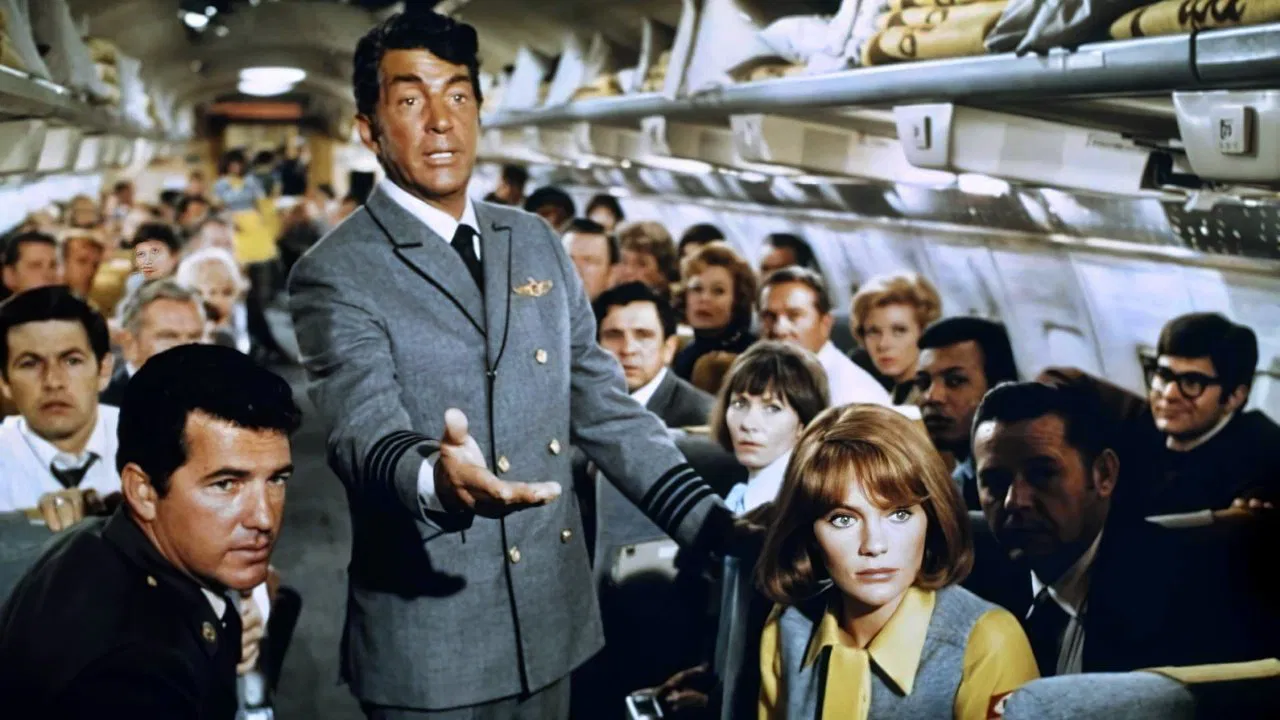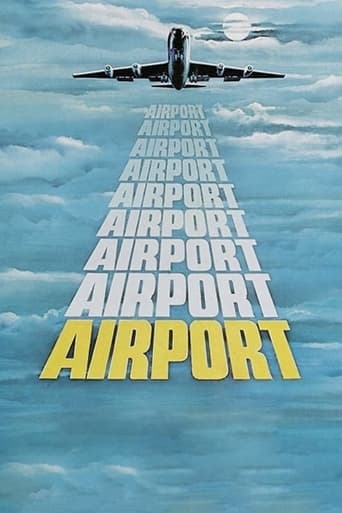

That was an excellent one.
... View MoreI think this is a new genre that they're all sort of working their way through it and haven't got all the kinks worked out yet but it's a genre that works for me.
... View MoreIt really made me laugh, but for some moments I was tearing up because I could relate so much.
... View MoreIt is a whirlwind of delight --- attractive actors, stunning couture, spectacular sets and outrageous parties.
... View MoreAirport 1970 is a surprisingly engaging drama and just about worth the time investment given its attention to detail and faith paid to backstory, and of course its stellar cast of great actors like the intense Burt Lancaster, dashingly heroic Dean Martin and tough and assured cigar-chomping George Kennedy. It's a bit old-fashioned, made at the tail end of the 60s in which dialogue can sound clichéd, action tame, but there is some surprising humour with Helen Hayes in Academy Award winning form, and some nice one-liners from the strapped in supporting cast. It wasn't until Airport 1975 that the dialogue and stereotypical narrative would get so corny and ridiculous so as to inspire Zucker Bros & Co. to parody the air disaster epic.
... View MoreIf the disaster film genre of the 1970s had an actual starting point, it would most likely have been with the spectacular success in 1968 of Arthur Hailey's best-selling novel Airport, which detailed the major ins and outs of an ultra-busy airport where things like stowaways, stuck aircraft, and security breaches are all in a day's work. The book was such a monstrous success, selling in excess of a million copies within its first year of publishing, that it was almost inevitable that Hollywood would try to make it into a movie. And this is indeed what writer/director George Seaton, who had made the 1947 Christmas classic MIRACLE ON 34TH STREET, did after Universal bought the rights to it and got Ross Hunter (of THOROUGHLY MODERN MILLIE fame) to produce it, with a cast of all-stars. The end result, released in March 1970, would be a box office smash and lead not only to three sequels, but also begin a film genre that would be much maligned by a good deal of film critics into the 21st century.The setting for Airport is Lincoln International Airport in Chicago on a snowbound winter night. Burt Lancaster portrays the airport's general manager who, on this night, is beset by any number of minor crises, including a brother-in-law (Dean Martin) who needles him about the way he runs the place; a jet stuck in the snow out on the tarmac because its pilot cut the taxiway short; an elderly stowaway (Helen Hayes) causing havoc with security; and problems at home with a wife (Dana Wynter) who gets into an argument over his being far more obsessed with his job than with his home life. He somehow manages to keep it together, thanks to the help of a very reliable staff, including tough-as-nails mechanic Joe Patroni (George Kennedy), who helps to get that stuck 747 out of the snow so that a vital runway isn't clogged for too long (with that runway being closed, jets are forced to take off on a runway right in the path of homes whose owners have complained fiercely about the noise).This night, however, he is facing another, fare more serious crisis. A mentally unstable and very depressed man (Van Heflin) has managed to get on a flight from Chicago to Rome being piloted by Martin and Barry Nelson; and in his suitcase, the only one he brings onboard (and keeps very close to him) is a bomb. Alerted to this as the flight is passing through the airspace monitored from Cleveland, they try to turn the plane around and head back to Chicago while at the same time trying to find a way to disarm Heflin and not frighten any of the passengers. Unfortunately, Heflin manages to detonate the bomb inside a bathroom, causing significant damage to the plane and injuring several passengers in the bargain, including a pregnant chief stewardess (Jacqueline Bisset). They have to fight the bad weather in the air and make it to Chicago, advising Lincoln Tower that they have to land on the main runway or there's no guarantee that anyone will survive Although clearly meant to be nothing more than old-fashioned Hollywood entertainment (and even in 1970, it definitely looked old-fashioned), AIRPORT, for all its melodramatics and sometimes off-center sense of humor, generated primarily by Hayes' dotty performance as the elderly stowaway (which won her a Best Supporting Actress Oscar), works quite well for what it was intended to be. The performances by Lancaster, Martin, Bisset, Kennedy, and Hayes are all what you'd expect from professionals like them; and the cast includes Larry Gates, Maureen Stapleton, Jean Seberg, Lloyd Nolan, Barbara Hale, and Whit Bissell. Alfred Newman's score (his last; he passed away only a few weeks before the film's release) is also quite good and appropriate (its love theme was turned into a million-selling instrumental hit by studio guitarist Vincent Bell in 1970), and got Newman both an Oscar and a Grammy nomination posthumously.While a lot of the clichés introduced in this film and tits three subsequent sequels would nauseate critics for most of the rest of the decade, AIRPORT nevertheless moves at a fairly good clip, given that it's close to 140 minutes in length and its special effects are painfully dated in the 21st century age of CGI. It also helps that some of the concerns raised in this movie, which came true in light of 9/11, have somehow managed to keep this film relatively relevant, which is saying something, given how many Hollywood films come and go every year.
... View MoreRoss Hunter's big budget, star laden soap opera, "Airport," is set at a large Chicago airport during a heavy snowstorm; the now-dated film is compulsively watch-able and provides a time-warp view of air travel in a seemingly distant past. Headed by five Oscar winners, Burt Lancaster, Helen Hayes, Van Heflin, Maureen Stapleton, and George Kennedy, the glossy movie probes the infidelities and family turmoil that play out in fashionable homes and posh offices, while the airport suffers a blocked runway, local protesters, and an airborne 707 heading for an emergency landing. Jean Seberg and Jacqueline Bisset provide romantic distractions, Barry Nelson and Dean Martin stoically pilot an airplane with multiple crises, while George Kennedy digs an airliner out of snow and Helen Hayes plays a game of stowaway with airline personnel.Based on a best-selling novel by Arthur Hailey, "Airport" is light fluffy nonsense that still entertains, although perhaps not always as intended. Contemporary viewers will be slack-jawed at the ease of boarding a plane without a ticket or boarding pass, bringing unscreened bags aboard, flying to Rome without a passport, or entering the cockpit with only a knock on the door. The open overhead bins are completely filled with blankets and pillows; passengers seemingly fly with no carry-on luggage; and the pilot strolls the aisle making casual conversation with passengers. Airport management and airplane crew evidently find illegal stowaways funny and wink at the practice, especially when it involves a perky 70-year old woman. Although memories of flying before 9/11 are fading for most, the concept of such casual security practices even in more innocent times seems absurd. Capably directed by veteran George Seaton, "Airport" is solid and old fashioned; the split-screen effects that were popular at the time now seem quaint and almost comic. Ernest Laszlo's cinematography is colorful and sharp, but always brightly lit as though for a made-for-television movie. Alfred Newman's fine score, however, is the film's one major asset that endures.In the period when Hollywood studios still retained clout with the voting members of the Motion Picture Academy, "Airport" was nominated for 10 Academy Awards and received one for Helen Hayes's supporting performance. In retrospect, the film deserved its nods for Newman's score and Stapleton's performance and possibly one more for Van Heflin, but the other nominations are a tribute to box office power and Universal's lobbyists. However, Ross Hunter's colorful fantasy of life at an airport is still fun and entertaining. Leave logic and high expectations behind and wallow in the high-power stars and seasoned supporting players as they face unwanted pregnancies, financial reverses, missed dinners, interrupted trysts, mischievous grandmothers, annoyed neighbors, unloved wives, stranded airplanes, and lots and lots of snow. Now a fascinating period artifact, "Airport" remains fast-moving fun.
... View MoreSo it was the start of 70's where special effect guys were still struggling to give out the best.This one is quite enjoyable although special effects were sought of cheesy.It lacks the glamor of big budget with mediocre sound track.Star cast was promising which delivers as expected.Sometimes dialogs feels like you are watching a 50's movie only in color which i suppose due to the fact that book came in 1958. The old stowed away lady provided the much needed comic relief.Only thing that got me was the post marital relationship was taken as too casual.In the end everyone gets along with the ladies and not with their spouses. Go watch this flick you will never get bored.
... View More